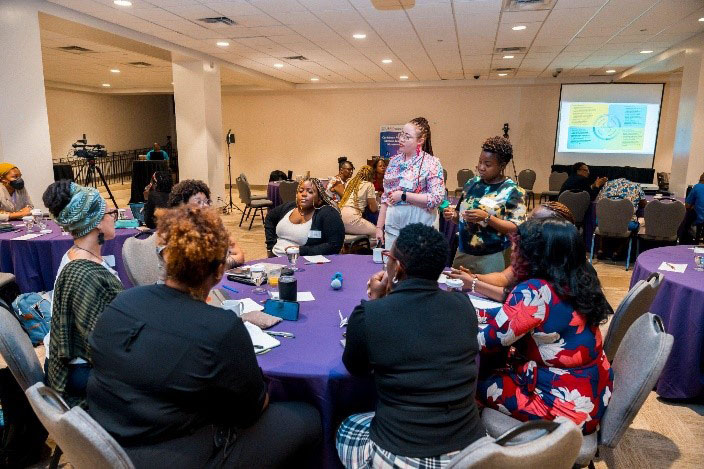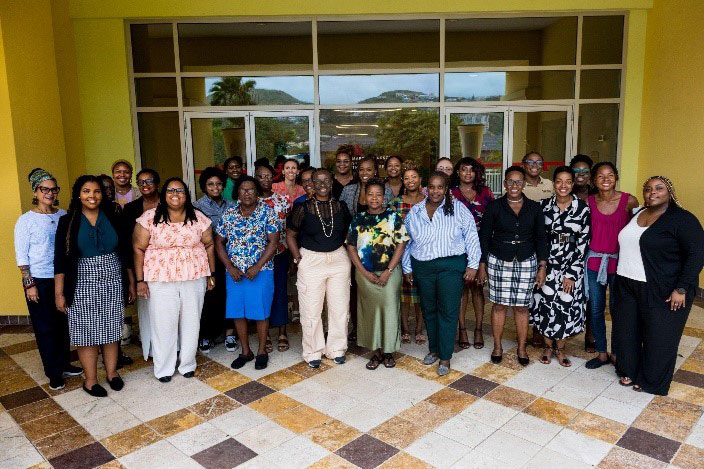Three locally based grassroots non-governmental organisations (NGO) have been awarded grants totalling US$75,000 by the Caribbean Feminist Climate Justice Movement (CFCJM), in partnership with the Global Fund for Women (GFW).
The Caribbean Feminist Climate Justice Movement is a collective of gender specialists, researchers and organizations informed by feminist and Indigenous knowledge systems that is dedicated to advancing gender equality and climate justice in the Carib-bean, while the Global Fund for Women is a key champion for the movement in the Caribbean, providing generous financial support while also building capacity and fostering connections to ensure the continued growth and success of the CFCJM.
In a release dated October 21, the CFCJM stated that that these “historic” grants, given to Green Heart Movement, Red Thread, and Wapichan Women’s Movement, will finance grassroots initiatives in Guyana that address the critical intersection of climate action and gender justice.

It explained that the selected grantee partners are among 22 grassroots organisations from ten countries across the Carib-bean, working at the intersection of feminist organising and climate justice. The women-led groups work on tackling the pressing challenges posed by climate change to marginalised groups, including women and gender diverse people, Indigenous and rural communities, and people of African and Indian descent.
It also disclosed that 22 organisations from Antigua and Barbuda, Barbados, The Bahamas, Guyana, Jamaica, Saint Kitts and Nevis, Saint Lucia, Saint Vincent and the Grenadines, Suriname, and Trinidad and Tobago, were successful in accessing grants based on for their innovative approaches to advancing climate resilience, gender equality, and social justice.
GFW Technical Director for Climate Justice, Ayesha Constable spoke of women bearing the brunt of gender equality and the importance of women taking leadership roles to challenge the climate crisis. “The activists that are part of the movement, most of whom are women and girls, live in the communities besieged by climate change and best understand the needs of those most at risk. As women, historical and current drivers of gender inequality perpetuate the injustices they are subjected to -which are exacerbated by the climate crisis. This underscores the importance of their (women’s) leadership in responses which are rooted in justice, equity, and access for all; that challenges the systems that drive the climate crisis; and that engenders innovative approaches to knowledge building, adaptation, mitigation, and collective action.”
A collective investment in climate resilience
According to the release, each organisation received US$25,000 to support projects championing climate justice at the intersection of food security, economic justice and gender justice. This funding is part of CFCJM’s broader goal to facilitate accessible, sustainable and flexible funding for Carib-bean feminist organisations which traditionally experience financing challenges and promote feminist climate justice, ensuring that vulnerable communities across the Carib-bean are equipped to combat the impacts of climate change.
CFCJM Technical Advisor, Dr Joyelle Clarke explained the Movement’s intentions. “It is our intention to support the growth of a feminist climate justice movement in the region. One based on access to flexible financing. One premised on trust-based philanthropy and one which supports the efforts of grassroots organizations.”
Constable, meanwhile, further elaborated on GFW’s rationale for supporting CFCJM through the provision of grant funding. “While GFW contributes to the financial resources needed to build more resilient communities, it is grassroots organizations’ labour, knowledge and; social and political capital that enables the transformation. This approach is at the core of our efforts towards intersectionality, trust-based partnerships, and power-sharing for more just climate action. We are privileged to work with and learn from these actors.”
Country Lead and Advisory Committee member of the CFCJM, Angelique V. Nixon also shed light on the organisations selected. “The organisations selected in the Guyana are engaged in community-led work guided by feminist principles and prioritising those most impacted by the climate crisis. Each of these grantee partners will make significant contributions to the new and growing network of regional organisations and activists who comprise the Caribbean Feminist Climate Justice Movement. Our guiding principles as the CFCJM is to centre feminist principles and Indigenous know-ledge systems through community-based solutions, decolonial practices, and collective solidarity building.”
Champions of Climate Action in Guyana
The funded projects spearheaded by Green Heart Movement, Red Thread and Wapichan Women’s Movement, the release noted, underscore the critical work being undertaken by women-led organisations in Guyana. Representatives of each of the NGOs spoke on the impact of this funding.
Co-founder of The Greenheart Movement, Sherlina Nageer, stated, “This funding will enable us to build connections with and capacity of women, youth, elders, Indigenous persons, and LBGTIQ Guyanese who have historically been marginalized and underserved by the existing governance and decision-making structures. These are the same groups of people who are the most negatively impacted by climate breakdown. With this funding, we plan to increase the capacity of persons in these groups to articulate their concerns and advocate for their visions relating to environmental health and safety, and just, sustainable development at the community, regional, and national level.”
Executive member of Red Thread, Wintress White, noted, “Our most recent accomplishment is broadening our anti-violence work to address environmental violence and climate justice. Our aim is to continue the work we have started on this issue by working closely with the young women in our youth network to get them to understand the negative impact on oil and gas on our health and livelihoods and together, be able to present this to Guyanese people in accessible forms for discussion – in written form, in performances, in radio shows etc.”
And Coordinator of the Wapichan Women’s Movement, Immaculata Casimero, added, “In the face of climate change, it is essential that we recognize the interconnectedness of environmental sustainability and gender equality. Our project aims to empower Indigenous women in the South Rupununi, Guyana as vital agents of change, ensuring that their voices are heard and their rights upheld. By addressing the specific climate and gender justice challenges, we will create resilient communities that not only protect our environment but also uplift and equip women to lead the charge towards a sustainable future.
The Caribbean Feminist Climate Justice Movement assured of its commitment to continue its mission to reimagine philanthropy, centre community voices, and mobilise feminist climate solutions that are inclusive, equitable, and sustainable, the release added.






